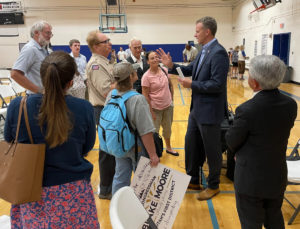The claim: Kamala Harris said she’d use executive action, Congress on reparations if elected president
A Sept. 17 Instagram video (direct link, archive link) shows Vice President Kamala Harris speaking about the longterm effects of slavery, housing discrimination and the Jim Crow era in the U.S.
“We need to speak truth about it, and we need to speak truth about it in a way that is about driving solutions,” Harris says during the 90-second clip. “And frankly I think that we, you know, and part of that is studying it to figure out exactly what we need to do.”
On-screen text in the post reads, “Kamala Harris says she would use executive action and ask Congress to ‘study reparations’ if elected President.”
The post was liked more than 2,000 times in five days.
More from the Fact-Check Team: How we pick and research claims | Email newsletter | Facebook page
Our rating: Partly false
The post inaccurately describes Harris’ comments in a September interview with the National Association of Black Journalists. The full video and transcript of the event show she did not say she would use executive action to study reparation proposals for Black Americans. She suggested the issue is best suited for Congress.
Journalist raises Harris’ past support for reparations bill
The clip in the Instagram post shows Harris responding to a question from Gerren Keith Gaynor, a White House correspondent and managing editor of politics at TheGrio, in an interview hosted by the National Association of Black Journalists in Philadelphia on Sept. 17.
Gaynor noted Harris, as a senator, supported legislation to establish a commission to study the lasting impacts of U.S. slavery and develop reparation proposals for African Americans. He asked Harris whether she, if elected president, “would take executive action to create this commission, or do you believe that it should happen in Congress?”
Harris first offered praise for the late Texas Rep. Sheila Jackson Lee – who had become the chief backer of the reparations commission bill H.R. 40 in the U.S. House of Representatives – and then expressed a general openness to studying what she described as the “generational impact of our history,” video posted by the NABJ shows. But the vice president sidestepped a direct answer to the question about executive action.
The video shows Gaynor pressed Harris on the point, asking in a follow-up question, “Do you have a position on whether that should happen – this commission should happen through executive order or via Congress?”
Harris’ response to this follow-up question, which isn’t shown in the Instagram post, did not rule out the potential use of executive order on the topic, but it also did not include a promise to take executive action to study reparations, according to footage and a White House transcript of her remarks. Rather, she suggested Congress would be the appropriate venue to establish such a commission.
Here’s what Harris said, in part:
“I
Fact check: Harris comment on destroying lives was about using power responsibly
Reports of the event from NBC News and the San Francisco Chronicle similarly show Harris did not pledge to take executive action to create a commission to study reparation proposals.
In an email, James Singer, a spokesperson for Harris’ presidential campaign, referred USA TODAY to Harris’ remarks in the NABJ interview and declined further comment.
Most Americans are against the idea of reparations for slavery, according to a 2021 Pew Research Center survey. The poll found 30% of all U.S. adults believe the descendants of enslaved people should be repaid in some fashion. The survey reported 77% of Black Americans say they support reparations, while 18% of white Americans say they do.
Harris expressed support for reparations and studying the issue during her first presidential campaign in 2019.
In a February 2019 interview with The Root, Harris said, “I think there has to be some form of reparations, and we can discuss what that is. But look, we’re looking at more than 200 years of slavery. We’re looking at almost 100 years of Jim Crow. We’re looking at legalized segregation, and, in fact, segregation on so many levels that exist today based on race.”
In a March 2019 interview with NPR, Harris discussed the question of reparations in the context of health disparities. She specifically noted elevated rates of heart disease and high blood pressure among African Americans, drawing a connection between such disparities and the legacy of slavery.
“I think that the word, the term reparations, it means different things to different people,” Harris told the public radio network at the time. “But what I mean by it is that we need to study the effects of generations of discrimination and institutional racism and determine what can be done, in terms of intervention, to correct course.”
USA TODAY reached out to the Instagram user who shared the post but did not immediately receive a response.
Our fact-check sources:
- James Singer, Sept. 19, Email exchange with USA TODAY
- Congress.gov, 2019, S.1083 – H.R. 40 Commission to Study and Develop Reparation Proposals for African-Americans Act
- The Root, Feb. 26, 2019, Exclusive: Kamala Harris Calls for Decriminalization of Sex Work, Unequivocally Calls Trump a Racist and Wants Reparations (Sort of)
- NPR, March 14, 2019, Sen. Kamala Harris On Reparations
- NABJ Headquarters (YouTube), Sept. 17, #NABJ Conversation with Vice President Kamala Harris in Philadelphia at WHYY
- The White House, Sept. 17, Remarks by Vice President Harris in a Conversation with the National Association of Black Journalists | Philadelphia, PA
- NBC News, Sept. 17, NABJ journalists press Harris for policy details on Gaza and reparations
- San Francisco Chronicle, Sept. 17, Kamala Harris declines to embrace reparations in rare race-focused interview
Thank you for supporting our journalism. You can subscribe to our print edition, ad-free app or e-newspaper here.
USA TODAY is a verified signatory of the International Fact-Checking Network, which requires a demonstrated commitment to nonpartisanship, fairness and transparency. Our fact-check work is supported in part by a grant from Meta.




